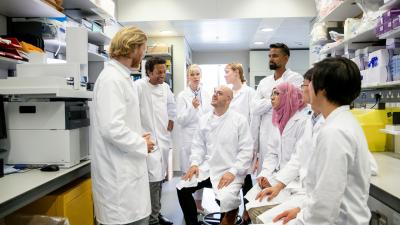Physicians Committee Praises NIH for Closing Last Beagle Lab on Its Campus

WASHINTON, D.C.—The National Institutes of Health has closed the last beagle laboratory on its campus, according to National Institutes of Health Director Jay Bhattacharya, MD, PhD, a move the nonprofit Physicians Committee for Responsible Medicine, which advocates for ending animal research and utilizing human-based research, is praising.
“We got rid of all the beagle experiments on the NIH campus,” Dr. Bhattacharya said in an interview this weekend on FOX & Friends.
“The NIH’s closure of its last beagle lab is a huge step forward in its efforts to move away from animal research. Cutting funding for animal experiments and bolstering human-based research will save animals and lead to better understanding and treatments of human disease,” says Catharine E. Krebs, PhD, medical research program manager for the Physicians Committee for Responsible Medicine. “We look forward to more animal lab closures, both at the NIH and at institutions it funds, as innovative research using tissue chips, computational methods, and other human-based approaches becomes the norm rather than the exception.”
Dr. Bhattacharya’s interview comes just days after NIH’s landmark commitment to prioritize innovative, human-based methods, like organoids, tissue chips, computational models, and real-world data analyses, while reducing animal use.
Last month, the Physicians Committee and 324 scientists, physicians, and other health professionals sent a letter to Director Bhattacharya, asking him to cut funding for animal experiments, and to lead the agency in the important shift away from the use of animals in medical research in favor of human-based science. The organization has long engaged with the NIH, encouraging it to move in this direction.
These changes are popular among the public: In a recent Physicians Committee/Morning Consult poll, 85% of Americans agreed that “animal experimentation should be phased out in favor of more modern research methods.”
Animal experiments are poorly representative of human health and disease and rarely predictive of drug efficacy, safety, and toxicity in humans. The reliance on animals is a direct contributor to high failure rates in the drug development pipeline, wasting billions of dollars each year and putting trial participants and patients at risk by failing to capture unsafe or ineffective products. As a result, untold numbers of dogs, cats, monkeys, mice, rats, and other animals are bred and used in painful and deadly research and testing procedures—estimated to be greater than 100 million per year in the United States.
Innovative 3D in vitro technologies like tissue chips, organoids, and bioprinting, as well as advanced computational modeling and real-world data analyses, are already being used to replace animals in a variety of applications, including disease modeling, precision medicine, and regulatory toxicology. These pioneering methods, also called new approach methodologies, use human cells, tissue, and data to replicate human-specific biology and disease characteristics and have enormous potential to revolutionize medical research and testing.
Founded in 1985, the Physicians Committee for Responsible Medicine is a nonprofit organization that promotes preventive medicine, conducts clinical research, and encourages higher standards for ethics and effectiveness in education and research.







